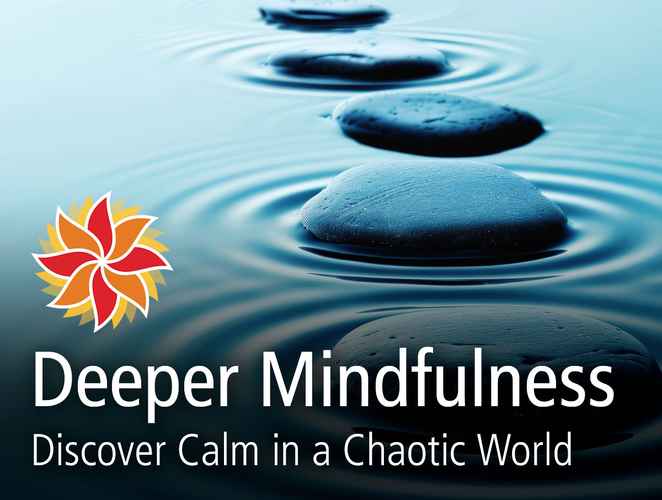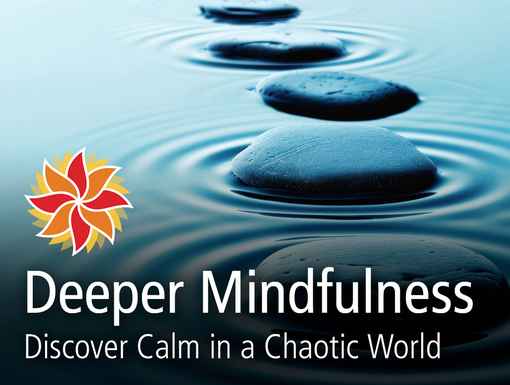Deeper Mindfulness: A New Way to Discover Calm in a Chaotic World
Using the latest advances in neuroscience and ancient wisdom traditions, this course deepens understanding of yourself and provides tools for transformation.
What Can I Learn by taking Deeper Mindfulness?
Required Course Materials
The Deeper Mindfulness book as a  source for material, purchased separately. Note: The audiobook is not recommended for class.
source for material, purchased separately. Note: The audiobook is not recommended for class.
Deeper Mindfulness delves into the moment-by-moment experience of what feels pleasant, unpleasant, or neutral - the often-overlooked aspect of mindfulness—feeling tone.
Through the application of the latest neuroscience and traditional meditative practices, participants learn to observe feeling tone in real-time, gaining insight into how it shapes emotional responses and daily experiences, and discover ways to reduce stress and cultivate emotional balance.
What are the Benefits of Deeper Mindfulness?
While each student's experience is unique, the published research has shown changes like these are common.
- Deepen your existing mindfulness practice by tuning into the subtle experience of feeling tone.
- Gain tools to break cycles of stress, exhaustion, and emotional reactivity.
- Learn to navigate difficult emotions with greater ease and wisdom.
- Cultivate a sense of presence and appreciation for everyday life, even in challenging moments.
- Strengthen emotional resilience through practical, science-backed techniques.
What are the prerequisites and requirements for this course?
The course is open those who have completed MBSR, MBCT, Mindfulness for Life, or another 8-week course, such as Mindfulness-Based College (MB-College), modeled after MBSR or MBCT. You need to be able to commit to attending all 8 sessions of the program; have both the time and motivation to dedicate up to 45 minutes of personal practice each day; be
18 years of age or older, and have access to suitable technology (laptop/PC), a strong and stable internet connection, a private space and the technical ability to join this live-online course via Zoom, with your camera on.
Pay-It-Forward
$50-$175
This is an opportunity to support those with limited resources, making courses accessible to those that cannot pay the standard rate. Paying at this level is an act of generosity.
Most popular
Standard Rate
$575
The standard rate covers the costs of these courses, making it possible for MHI to continue to offer them.
Scholarship
$425
This rate is available for those who cannot afford to pay the standard rate. We ask you to use this rate only if paying the higher rate creates a hardship for yourself and/or your family.
Course pricing is set to allow for generosity while meeting individuals needs. Course prices include Pay-It-Forward, Standard, and Scholarship rates. We encourage you to pay what you can afford and we appreciate your care and thoughtfulness when deciding.
Payment plans are available at checkout. See our refund policy.
Upcoming Deeper Mindfulness Courses
All times are in EASTERN TIME (ET). Timezone converter.
September 15 to November 3, 2026 - Instructor Sarah Kinsley
Live Online via Zoom
Classes: Tuesdays, September 15, 22, 29, October 6, 13, 20, 27, November 3
Times: 6:00pm - 8:15pm ET
Don't see dates/times that work for you? Join the Deeper Mindfulness waitlist to be notified when a course is available.
“Deeper Mindfulness was a simultaneously educating, grounding, and transformative course. Sarah's soft, compassionate presence and excellent facilitation skills made the class comfortable and safe enough to challenge my ability to "be with" difficulty, which ultimately helped me to face longstanding challenges in my life with acceptance. The course was structured enough to encourage daily practice, but offered many options and flexibility, which I found to be trauma sensitive and inviting. I would highly recommend this course for anyone looking to deepen their mindfulness skills in a supportive and informative container.”
Student
Deeper Mindfulness Student
What is Deeper Mindfulness: A New Way to Discover Calm in a Chaotic World?
Deeper Mindfulness offers a transformative eight-week program designed by Professor Mark Williams and Dr. Danny Penman. By integrating cutting-edge neuroscience with ancient wisdom, this course helps you tap into the hidden layers of mindfulness known as the feeling tone, which colors every moment of life. Whether you're facing anxiety, stress, or depression, Deeper Mindfulness teaches you how to recognize pivotal moments before they control your actions, allowing you to respond with calm and clarity. The practices empower both beginners and experienced meditators to navigate life's challenges with renewed strength and equanimity.
Psychological Foundations: Recent psychological research shows that our perceptions and actions are shaped by unconscious predictions, and each experience is accompanied by a feeling tone (pleasant, unpleasant, or neutral). This process of continuous "read-outs" influences how we respond to the world and how our body allocates resources.
The Role of Feeling Tone: Feeling tone is highlighted as a key factor in determining emotional reactions, driving both pleasant and distressing experiences. The course helps participants recognize the tipping points at which they become emotionally entangled or triggered, leading to improved emotional regulation.
Ancient and Modern Insights: This concept is rooted in both modern psychological research and ancient mindfulness traditions, aligning with teachings from noted meditation teachers such as Joseph Goldstein. Goldstein refers to mindfulness of feeling tone as a "master key" to unlocking deep-seated emotional patterns.
Practical Applications: The course includes new meditations and practices, provided through resources such as the Deeper Mindfulness book, which allow participants to engage deeply with their mindfulness practice and gain insight into their emotional and cognitive patterns.
This nuanced and research-backed exploration into mindfulness is supported by findings in the fields of cognitive psychology and neuroscience, offering participants the tools to develop resilience and emotional clarity.
What is the Weekly Overview of Deeper Mindfulness: A New Way to Discover Calm in a Chaotic World?
The Deeper Mindfulness weekly summary of the curriculum presented here serves as a general overview and is subject to potential modifications based on the unique needs, insights, and discussions that may arise during class.
Week 1: Finding your ground
Exploring different strategies and a range of anchors (as well as the breath) for when the mind/body is restless or overwhelmed by difficulty or trauma
Week 2: The Pause: befriending and gathering the scattered mind
Exploring ways of befriending and gathering the mind when lost in rumination and worry, by pausing to register any self-judgement of mind-wandering and cultivate gratitude and understanding of what the mind is trying to do.
Week 3: Discovering the feel-of-things
Registering the “feeling tone” (pleasant, unpleasant or neither) of whatever arises, moment by moment, starting with sounds, body sensations or thoughts in meditation practice and in everyday life.
Week 4: Restoring balance
Learning to allow feeling tones as a way of staying balanced. Discovering the freedom that comes from seeing tonality as natural, and from giving permission to like what’s pleasant and not to like what’s unpleasant.
Week 5: Feeling-tone at the fringes of consciousness
Registering the feeling tone moment by moment to see more clearly subtle changes that arise from ongoing activity in mind /body at the fringe of consciousness, and noticing when the mind is gearing up for unnecessary action.
Week 6: Approaching difficult emotions
Focusing on body sensations that occur with emotions, sensing their feeling tone (as in Week 3) allowing them (as in Week 4) and letting go of a need for immediate action (as in Week 5) as way of cultivating insight and kindness.
Week 7: Reclaiming your life
Exploring the intimate connection between feeling tone, mood and activity, recognizing reactivity to feeling tone, using awareness of feeling tone as a wise guide towards skillful action
Week 8: Deepening mindfulness, cultivating wisdom
Supporting intentions to be mindful, including awareness and responsiveness to feeling tone, less trapped in the “driven mode” brought on by reactivity to feeling tone, and considering a “year-of-practice” guide to help this.
What are the Learning Objectives and Outcomes of Deeper Mindfulness: A New Way to Discover Calm in a Chaotic World?
- Understand the psychological and neurobiological foundations of feeling tone (vedana) and how it influences perception and emotional responses.
- Develop advanced mindfulness skills to recognize and observe the feeling tone of sensory experiences, thoughts, and emotions.
- Learn to respond to feeling tone without being drawn into habitual reactions that lead to stress and emotional distress.
- Cultivate mindfulness techniques to anchor attention, take pauses, and foster self-compassion during moments of difficulty.
- Gain the ability to notice the early signs of emotional overwhelm or exhaustion and apply mindfulness to restore balance.
- Use mindfulness to navigate difficult emotions and cultivate positive experiences, transforming daily life into opportunities for appreciation and growth.
- Build a personal mindfulness practice that includes both structured meditation and informal mindfulness integrated into everyday activities.
Continuing Education Credits
Help and Events
- Help and Contact Information
- How To and FAQs
- Policies and Procedures
- Advising Sessions
- Information Sessions
- Mindfulness In This Moment
- Free Community Sessions


